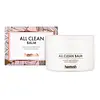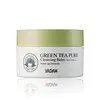What's inside
What's inside
 Key Ingredients
Key Ingredients

 Benefits
Benefits

 Concerns
Concerns

 Ingredients Side-by-side
Ingredients Side-by-side

Ethylhexyl Palmitate
EmollientCetyl Ethylhexanoate
EmollientPEG-20 Glyceryl Triisostearate
EmollientPolyethylene
AbrasivePEG-8 Isostearate
Emulsifying1,2-Hexanediol
Skin ConditioningButyrospermum Parkii Butter
Skin ConditioningTocopheryl Acetate
AntioxidantCitrus Aurantium Dulcis Peel Oil
MaskingLavandula Angustifolia Oil
MaskingPelargonium Graveolens Flower Oil
MaskingAmyris Balsamifera Bark Oil
MaskingEucalyptus Globulus Leaf Oil
PerfumingMelaleuca Alternifolia Leaf Oil
AntioxidantCitrus Paradisi Peel Oil
MaskingCitrus Aurantium Bergamia Fruit Oil
MaskingBoswellia Carterii Oil
MaskingJuniperus Mexicana Oil
MaskingWater
Skin ConditioningCocos Nucifera Fruit Extract
EmollientButylene Glycol
HumectantCitrus Aurantifolia Fruit Extract
Skin ConditioningCitric Acid
BufferingPhenoxyethanol
PreservativeNelumbium Speciosum Flower Extract
Skin ConditioningFreesia Refracta Extract
Skin ConditioningRose Extract
Skin ConditioningLeontopodium Alpinum Extract
Skin ConditioningJasminum Officinale Extract
MaskingNarcissus Pseudo-Narcissus Flower Extract
Skin ConditioningLilium Tigrinum Extract
Skin ConditioningIris Versicolor Extract
EmollientEthylhexylglycerin
Skin ConditioningLimonene
PerfumingCitral
PerfumingLinalool
PerfumingEthylhexyl Palmitate, Cetyl Ethylhexanoate, PEG-20 Glyceryl Triisostearate, Polyethylene, PEG-8 Isostearate, 1,2-Hexanediol, Butyrospermum Parkii Butter, Tocopheryl Acetate, Citrus Aurantium Dulcis Peel Oil, Lavandula Angustifolia Oil, Pelargonium Graveolens Flower Oil, Amyris Balsamifera Bark Oil, Eucalyptus Globulus Leaf Oil, Melaleuca Alternifolia Leaf Oil, Citrus Paradisi Peel Oil, Citrus Aurantium Bergamia Fruit Oil, Boswellia Carterii Oil, Juniperus Mexicana Oil, Water, Cocos Nucifera Fruit Extract, Butylene Glycol, Citrus Aurantifolia Fruit Extract, Citric Acid, Phenoxyethanol, Nelumbium Speciosum Flower Extract, Freesia Refracta Extract, Rose Extract, Leontopodium Alpinum Extract, Jasminum Officinale Extract, Narcissus Pseudo-Narcissus Flower Extract, Lilium Tigrinum Extract, Iris Versicolor Extract, Ethylhexylglycerin, Limonene, Citral, Linalool
Olea Europaea Fruit Oil
MaskingCetyl Ethylhexanoate
EmollientEthylhexyl Palmitate
EmollientCaprylic/Capric Triglyceride
MaskingPEG-20 Glyceryl Triisostearate
EmollientBeeswax
Emulsion StabilisingHelianthus Annuus Seed Oil
EmollientWater
Skin ConditioningPhenoxyethanol
PreservativeButylene Glycol
HumectantCamellia Sinensis Leaf Powder 0.3%
ExfoliatingSimmondsia Chinensis Seed Oil
EmollientEthylhexylglycerin
Skin ConditioningCitrus Limon Peel Oil
MaskingCitrus Medica Vulgaris Peel Oil
MaskingCitrus Grandis Peel Oil
MaskingCitrus Aurantium Dulcis Oil
MaskingCitrus Nobilis Peel Oil
MaskingLavandula Angustifolia Oil
MaskingEucalyptus Globulus Leaf Oil
PerfumingRosmarinus Officinalis Leaf Oil
MaskingCitrus Aurantium Dulcis Flower Oil
AstringentOlea Europaea Fruit Oil, Cetyl Ethylhexanoate, Ethylhexyl Palmitate, Caprylic/Capric Triglyceride, PEG-20 Glyceryl Triisostearate, Beeswax, Helianthus Annuus Seed Oil, Water, Phenoxyethanol, Butylene Glycol, Camellia Sinensis Leaf Powder 0.3%, Simmondsia Chinensis Seed Oil, Ethylhexylglycerin, Citrus Limon Peel Oil, Citrus Medica Vulgaris Peel Oil, Citrus Grandis Peel Oil, Citrus Aurantium Dulcis Oil, Citrus Nobilis Peel Oil, Lavandula Angustifolia Oil, Eucalyptus Globulus Leaf Oil, Rosmarinus Officinalis Leaf Oil, Citrus Aurantium Dulcis Flower Oil
 Reviews
Reviews

Ingredients Explained
These ingredients are found in both products.
Ingredients higher up in an ingredient list are typically present in a larger amount.
Butylene Glycol (or BG) is used within cosmetic products for a few different reasons:
Overall, Butylene Glycol is a safe and well-rounded ingredient that works well with other ingredients.
Though this ingredient works well with most skin types, some people with sensitive skin may experience a reaction such as allergic rashes, closed comedones, or itchiness.
Learn more about Butylene GlycolCetyl Ethylhexanoate is an emollient ester. It comes from cetearyl alcohol and 2-ethylhexanoic acid.
Cetyl Ethylhexanoate is an emollient that adds a velvety feel to skin without being greasy or oily. Emollients help trap moisture into your skin, keeping your skin soft and hydrated.
Ethylhexyl Palmitate, also known as octyl palmitate, is created from 2-ethylhexyl alcohol and palmitic acid. It is a fatty acid ester.
The fatty acid content of Ethylhexyl Palmitate makes it an emollient. Emollients help soften and hydrate your skin by trapping moisture within.
Ethylhexyl Palmitate is also used to help improve the texture of cosmetics. It helps other ingredient dissolve in products and help disperse ingredients more evenly.
You'll likely find this ingredient in sunscreen, as it is often used to mix UV-blocking ingredients such as avobenzone and ethylhexyl triazone.
It can also help stabilize the fragrances in a product as a fragrance fixative.
Ethylhexyl Palmitate can be used to substitute mineral oil.
Due to its high fatty acid content, it may not be fungal-acne safe.
Learn more about Ethylhexyl PalmitateEthylhexylglycerin (we can't pronounce this either) is commonly used as a preservative and skin softener. It is derived from glyceryl.
You might see Ethylhexylglycerin often paired with other preservatives such as phenoxyethanol. Ethylhexylglycerin has been found to increase the effectiveness of these other preservatives.
This oil is derived from the leaves of Eucalyptus Globulus, a type of Eucalyptus tree native to Australia.
Though this oil shows antibacterial and antioxidant activity, it is also a known skin-irritant due to its fragrance components.
Lavandula Angustifolia Oil is more commonly known as lavender essential oil. It is considered a fragrancing ingredient.
Lavender imparts a famous scent. While the smell is lovely, this ingredient and may sensitize skin in topical products. This is because about 85% of the oil is made up of linalool and linalyl acetate.
When exposed to air, these two compounds become strong allergens. This ingredient exhibits cytotoxicity at low concentrations; amounts of 0.25% have been shown to damage skin cells.
A study from Japan found this ingredient caused lavender sensitivity after widespread exposure.
Lavender essential oil has some antimicrobial, antibacterial, and anti-inflammatory properties. However, the cons of this ingredient may outweight the pros.
More research is needed to confirm lavender essential oil's effects when used in aromatherapy.
Lavandula Angustifolia is known as the English Lavender and famous for creating purple fields in Provence, France.
Learn more about Lavandula Angustifolia OilPeg-20 Glyceryl Triisostearate comes from Isostearic Acid and glycerin.
It is an emollient, emulsifier, and gentle cleanser. As an emollient, it helps trap moisture to keep skin soft and hydrated. Emulsifiers help prevent ingredients from separating.
This ingredient is common in oil-based products. This is because it helps oil-ingredients be easily washed away without leaving a residue.
Peg-20 Glyceryl Triisostearate may not be fungal-acne safe.
Learn more about PEG-20 Glyceryl TriisostearatePhenoxyethanol is a preservative that has germicide, antimicrobial, and aromatic properties. Studies show that phenoxyethanol can prevent microbial growth. By itself, it has a scent that is similar to that of a rose.
It's often used in formulations along with Caprylyl Glycol to preserve the shelf life of products.
Water. It's the most common cosmetic ingredient of all. You'll usually see it at the top of ingredient lists, meaning that it makes up the largest part of the product.
So why is it so popular? Water most often acts as a solvent - this means that it helps dissolve other ingredients into the formulation.
You'll also recognize water as that liquid we all need to stay alive. If you see this, drink a glass of water. Stay hydrated!
Learn more about Water